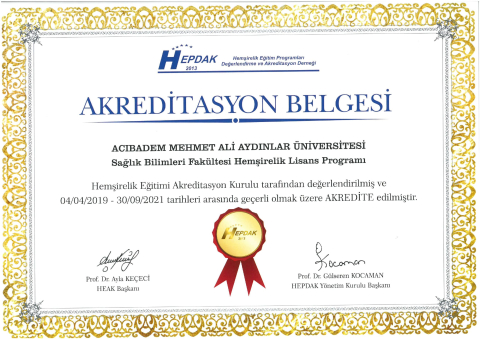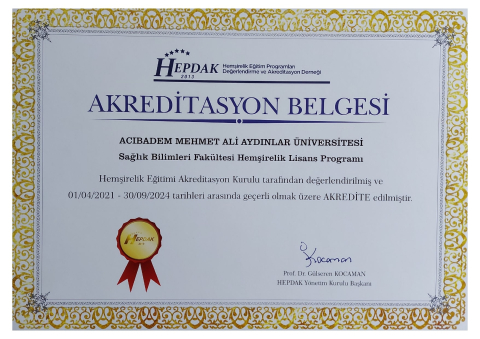Our Vision;
is to be the leading, most preferred and referenced nursing education institution with its nursing education, practice and research at national and international standards.
Our Mission;
is to train world-class leader nurses who can provide safe, evidence-based and quality care for healthy/sick individual and society; and the nurses who think critically, make critical decisions, have ethical and universal values, research skills, team understanding, innovative, difference, sensitive to culture, and contribute to the development of the profession.
OUR FUNDAMENTAL VALUES:
Acıbadem University Faculty of Health Sciences Department of Nursing;
- Accepts that the human being as a whole is unique.
- Emphasizes being faithful, reliable and accountable to ethical principles in the services it provides to the society,
- Believes in the superiority of science, adopts a systematic approach,
- Believes in the importance of corporate belonging, effective communication and teamwork in success.
OBJECTIVES OF THE NURSING UNDERGRADUATE EDUCATION PROGRAM
The aim of the program is to train nurses employed in health care institutions at all levels, who can provide holistic care with a systematic problem-solving approach and ethical sensitivity at national and international standards.
Performance indicator: More than 90% of graduates are employed in healthcare organizations Graduates take on the role of educator, researcher and leader who will guide the development of care and profession in a team understanding with innovative applications based on scientific data and technology.
Performance indicator: They should assume the role of educator, researcher and leader, which will guide the development of the profession, by more than 25% in the process following graduation. Graduates continue their academic, professional and personal development with the awareness of lifelong learning.
Performance indicator: Continuing their professional and academic development above 25% after graduation.
ACIBADEM MEHMET ALI AYDINLAR UNIVERSITY FACULTY OF HEALTH SCIENCES DEPARTMENT OF NURSING PROGRAM LEARNING OUTCOMES
- Has the basic knowledge, attitude and skills to provide safe and effective nursing care in the process of protecting, improving, treating and rehabilitating the health of the individual, family and society.
- Provides nursing care in line with the nursing process, using evidence-based knowledge and critical thinking skills.
- Uses problem solving, conflict and crisis management skills while performing nursing care practices in ordinary and extraordinary situations.
- Collaborates with health care team members, communicates effectively, and present professional autonomy within the team.
- Uses basic professional competencies in the fields of education and management.
- With awareness of social responsibility, cooperates with professional organizations and non-governmental organizations and takes part in projects and events.
- Participates in scientific research, critically evaluates scientific publications and reflects them into practice.
- Maintains nursing care practices in accordance with laws, ethical principles, cultural values, institutional policies and quality processes.
- With the awareness of lifelong learning, he/she continues professional and individual development and reflects this in his/her practices.
- In order to continue her/his development, professional communication and practices, uses English at least at the "European Language Portfolio B1 General Level".
- Uses information systems and health care technologies in nursing care practices.
COMPATIBILITY OF NURSING UNDERGRADUATE PROGRAM OBJECTIVES WITH PROGRAM OUTCOMES
| Program Çıktıları | EPA1 | EPA2 | EPA3 |
| PC1 | X | X | |
| PÇ2 | X | ||
| PÇ3 | X | X | |
| PÇ4 | X | X | X |
| PÇ5 | X | ||
| PÇ6 | X | ||
| PÇ7 | X | X | |
| PÇ8 | X | ||
| PÇ9 | X | X | |
| PÇ10 | X | X | |
| PÇ11 | X | ||
| PÇ12 | X | X | |
| PÇ13 | X | ||
| PÇ14 | X | X |
HEMŞİRELİK BÖLÜMÜ KALİTE POLİTİKASI
Hemşirelik Bölümü kalite çalışmaları Acıbadem Mehmet Ali Aydınlar Üniversitesi Kalite Politikası doğrultusunda ve üniversitenin stratejik hedeflerini destekleyecek şekilde sürdürülmektedir. Bu amaçla; 2017 yılı içinde Acıbadem Üniversitesi Stratejik Planlama Kurulu oluşturulmuş olup Sağlık Bilimleri Fakültesi Hemşirelik Bölümü üyelerinden Prof. Dr. Ükke Karabacak, Doç. Dr. Esra Uğur ve Dr. Öğretim Üyesi Zehra Kan Öntürk bu kurulda yer almıştır. Bu çalışmalarla eş zamanlı olarak Bölüm Stratejik Planlama Komisyonu kurulmuştur. Bu komisyonun çalışmaları kapsamında ve bölümün öğretim üye/ elemanlarının tamamının katılımıyla Hemşirelik Bölümü 2017-2021 Stratejik Planı oluşturulmuş, stratejik hedeflere ulaşılma durumu izlenmeye başlanmıştır.
Hemşirelik lisans programı; disiplinlerin yapısına dayalı programlardan biri olan “Klasik Eğitim Modeli’nde” oluşturuldu. Disiplin yapısına dayalı programlarda amaç, o disipline özgü kavram, kuram ve ilkelerin, araştırma, uygulama, eğitim ve yönetiminin öğretilmesidir. Bu şekilde disiplin alanına giren bilgiyi bütünleştirmek, organize etmek, sınırlarını ve boşluklarını göstermek ve geliştirmek esas alınır. Acıbadem Mehmet Ali Aydınlar Üniversitesi Hemşirelik Bölümü modelinin yapılandırılmasında ulusal ve uluslararası boyutta toplumun sağlık bakım gereksinimlerini karşılamaya yönelik gelişmeler dikkate alınmıştır. Program, Klasik Eğitim Modelinde hemşirelik eğitimi teorik ve uygulama bölümlerinden oluşmaktadır. Dersler; alanında uzman öğretim üye/elemanları tarafından yürütülmektedir. Klasik eğitim modeli doğrultusunda tüm anabilim dalları ders içeriklerini; insan, sağlık/hastalık, çevre ve hemşirelik ana kavramları çerçevesinde planlamakta ve öğrencilerin, bilişsel, psikomotor ve duyuşsal düzeyde öğrenmelerini destekleyecek şekilde aktif öğrenme yöntemleri kullanılarak yürütülmektedir. Anabilim dalına özgü dersler yürütülürken farklı hemşirelik model ve kuramları kullanılmaktadır. Yaşam Aktivitelerine Dayalı Hemşirelik Modeli, Fonksiyonel Sağlık Örüntüleri Modeli, OMAHA Sınıflama Sistemi, Adaptasyon Modeli, Kişiler Arası İletişim Modeli ve İnsan İnsana İlişki Modeli programda kullanılan modellerdir. Sahada ve kliniklerde yürütülen uygulamalarda model olarak, “İşbirlikçi Model- Klinik Öğretim Ortak Modeli” kullanılmaktadır.
Modele ilişkin bilgiler Hemşirelik Program Kılavuzunda yer almaktadır.
OBJECTIVES OF THE NURSING UNDERGRADUATE EDUCATION PROGRAM
The aim of the program is to train nurses employed in health care institutions at all levels, who can provide holistic care with a systematic problem-solving approach and ethical sensitivity at national and international standards.
Performance indicator: More than 90% of graduates are employed in healthcare organizations Graduates take on the role of educator, researcher and leader who will guide the development of care and profession in a team understanding with innovative applications based on scientific data and technology.
Performance indicator: They should assume the role of educator, researcher and leader, which will guide the development of the profession, by more than 25% in the process following graduation. Graduates continue their academic, professional and personal development with the awareness of lifelong learning.
Performance indicator: Continuing their professional and academic development above 25% after graduation
TR ACIBADEM MEHMET ALİ AYDINLAR UNIVERSITY FACULTY OF HEALTH SCIENCES DEPARTMENT OF NURSING PROGRAM LEARNING OUTCOMES
-
A graduate nurse has professional basic theoretical knowledge, attitudes and skills in line with changing science, technology and health needs.
-
A graduate nurse, using the theoretical knowledge and skills she has acquired, meets the health care needs of the individual, family and society in a systematic way, based on evidence, with a holistic approach.
-
A graduate nurse demonstrates problem solving, conflict and crisis management competencies when necessary, using the knowledge and skills she has acquired.
-
A graduate nurse carries out her practices with the awareness of her legal rights and responsibilities, and acts sensitively to professional developments.
-
A graduate nurse, by taking a confident and effective role in the healthcare team, works in an interdisciplinary and interdisciplinary team, reflects her professional autonomy and communicates effectively.
-
A graduate nurse, by protecting the value and dignity of each individual, provides quality nursing care services related to the protection, development, maintenance and correction of health, in line with the principles of patient safety.
-
A graduate nurse uses her core professional competencies in the fields of education and management.
-
A graduate nurse can organize and implement projects and activities for the social environment in which she lives by collaborating with professional and non-governmental organizations with a sense of social responsibility.
-
A graduate nurse acts in accordance with professional, social, scientific, cultural and ethical values.
-
A graduate nurse can participate in research, critically evaluate scientific publications, and reflect on practice.
-
A graduate nurse carries out nursing practices within the framework of professional principles, in accordance with institutional policies, quality and process management.
-
A graduate nurse adopts the importance of lifelong learning, follows scientific, technological and current practices, develops herself and her colleagues and reflects them on care.
-
A graduate nurse uses English at least at "European Language Portfolio B1 General Level" in order to follow professional developments and communicate with colleagues, patients and the community.
-
A graduate nurse uses current information and communication technologies effectively, at least at the "European Computer Use License Basic Level", in order to access, disseminate, and use in care practices in the field.
COMPATIBILITY OF NURSING UNDERGRADUATE PROGRAM OBJECTIVES WITH PROGRAM OUTCOMES
|
Program Çıktıları |
EPA1 |
EPA2 |
EPA3 |
|
PC1 |
X |
X |
|
|
PÇ2 |
X |
|
|
|
PÇ3 |
X |
X |
|
|
PÇ4 |
X |
X |
X |
|
PÇ5 |
|
X |
|
|
PÇ6 |
X |
|
|
|
PÇ7 |
|
X |
X |
|
PÇ8 |
|
X |
|
|
PÇ9 |
X |
X |
|
|
PÇ10 |
|
X |
X |
|
PÇ11 |
X |
|
|
|
PÇ12 |
|
X |
X |
|
PÇ13 |
|
|
X |
|
PÇ14 |
|
X |
X |
HEMŞİRELİK BÖLÜMÜ KALİTE POLİTİKASI
NURSING DEPARTMENT QUALITY POLICY Nursing Department quality studies are carried out in line with Acıbadem Mehmet Ali Aydınlar University's Quality Policy and in a way that supports the strategic goals of the university. To this end; In 2017, Acıbadem University Strategic Planning Board was formed and Prof. Dr. Ükke Karabacak, Doç. Dr. Esra Uğur and Assist. Prof. Dr. Zehra Kan Öztürk took part in this committee. Synchronously with these studies, the Department's Strategic Planning Commission was established. Within the scope of the work of this commission and with the participation of all the faculty members / staff of the department, the 2017-2021 Strategic Plan of the Nursing Department has been created, and the achievement of strategic goals has begun to be monitored.
Click here for the Nursing Department Strategic Plan.
Nursing undergraduate program was created in the “Classical Education Model”, which is one of the programs based on the structure of the disciplines. The purpose of the disciplinary programs is to teach the concepts, theories and principles specific to that discipline, research, practice, education and management. In this way, it is essential to integrate, organize, show and develop the limits and gaps of the knowledge that falls within the field of discipline. In the structuring of the Acıbadem Mehmet Ali Aydınlar University Nursing Department model, developments in meeting the health care needs of the society on a national and international scale were taken into account. The program consists of theoretical and practical parts of nursing education in the Classical Education Model. Lessons are carried out by academic members / staff who are experts in their fields. In line with the classical education model, all departments include course contents; It is planned within the framework of the main concepts of human, health/disease, environment and nursing and is carried out by using active learning methods to support students' learning at cognitive, psychomotor and affective levels. Different nursing models and theories are used while conducting courses specific to the department. Nursing Model Based on Life Activities, Functional Health Patterns Model, OMAHA Classification System, Adaptation Model, Interpersonal Communication Model and Human-People Relationship Model are the models used in the program. "Collaborative Model




